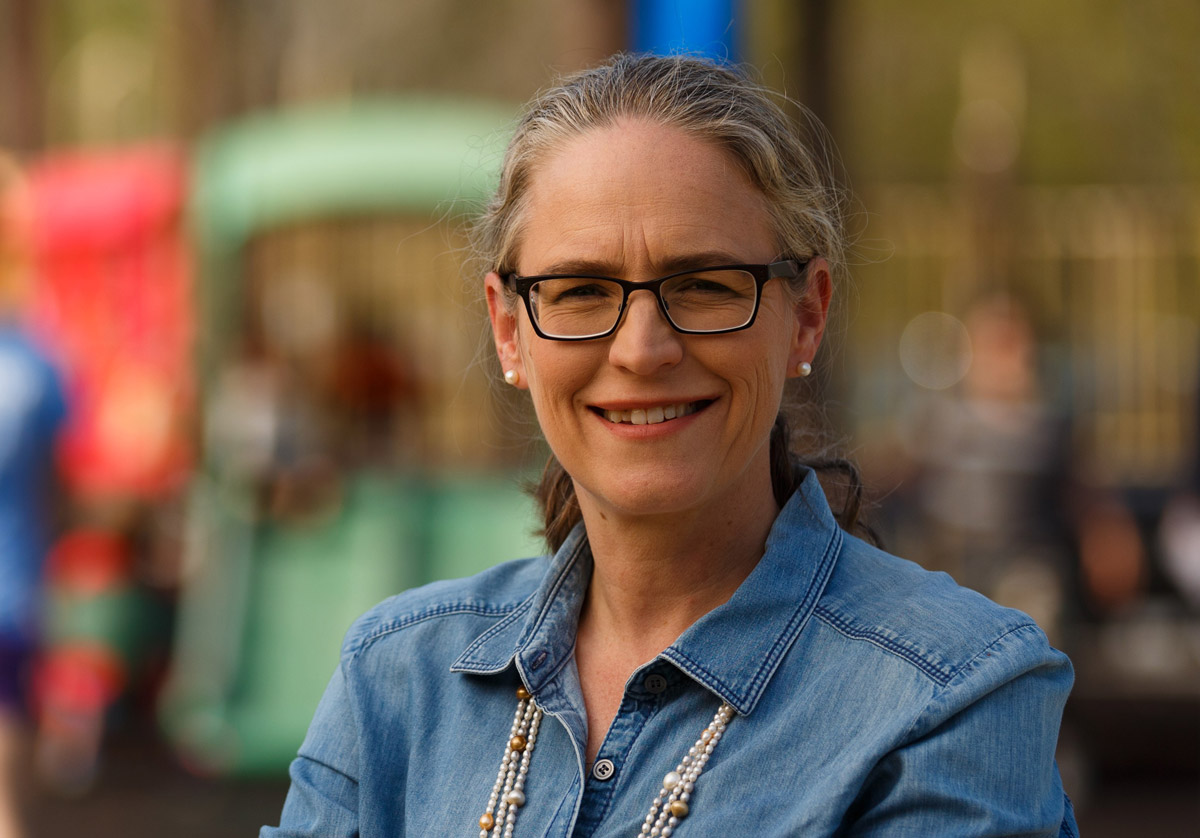
Photograph courtesy of Carolyn Bourdeaux campaign
Two candidates are running for Georgia’s 7th Congressional District seat: Republican Rich McCormick and Democrat Carolyn Bourdeaux. We sent the same 12 questions to both candidates. Bourdeaux’s responses are below. As of publication time, McCormick has not yet provided responses to our questions.
Responses have been edited for length and clarity.
If you’re elected, what does your first day in office look like?
Getting our arms around the COVID-19 pandemic and working to get our economy back on its feet is my top priority. I’m a champion for quality, affordable healthcare—it’s why I got into this race—and now we’re seeing that it’s more important than ever.
I’ll also proudly sign on to the John Lewis Voting Rights Advancement Act as one of my first acts when I’m elected to Congress.
How would you rate the local and national response to the COVID-19 crisis? What should public officials have done differently, what have they done well, and what responses do you want to see in the future?
We are suffering from a terrible lack of leadership on COVID-19. This pandemic is no one’s fault, but Donald Trump’s failure to protect us from it is [his fault]. Georgians deserve leaders who won’t play politics with their health, who listen to the scientists and think carefully about solutions that make sense. Our economy is not going to recover until we can feel comfortable going to a restaurant or grocery shopping without being afraid we will catch COVID-19—so listening to health experts to defeat this virus is critical to our economic recovery, too. Georgia won’t get through this crisis by following the lead of my opponent, who has repeatedly contradicted the experts and spread misinformation about this deadly disease. We need to make sure we carefully follow scientific guidance around testing, contact tracing, and mask-wearing, and expand healthcare access for uninsured Georgians.
What has the pandemic taught you about yourself?
I’ve gained an ever deeper appreciation for my son’s 3rd grade teacher as we’ve navigated digital learning from home.
Before a vaccine becomes widely available, should Americans be afforded another stimulus check? If so, for how much and who should be eligible to receive it?
The economic collapse due the pandemic has resulted in hundreds of thousands of Georgians out of work and thousands of small businesses—the backbone of our economy—shuttered. Stimulus payments, expanded unemployment insurance, and the Paycheck Protection Program (PPP) have given Georgians a lifeline, but more relief is sorely needed to keep families afloat and allow small businesses to keep their doors open.
In Congress, I’ll put families and small businesses first by funding existing programs and, if necessary, the creation of new programs to ensure the small business grants and loans are available to all that are in need. I will also ensure that the social safety net has the resources to help families in need support themselves until we can get our economy back on its feet.
Hundreds of thousands of Georgians could face eviction due to the economic hardships spurred by the pandemic, and many of those residents are relying on government-imposed eviction moratoriums to keep them at home for now. But once those protections expire, people will still owe rent. What recourse do they have? And what protections should landlords have for cases of delinquent renters? Should landlord and tenant laws be changed to adapt to the COVID-19 era?
Stimulus payments, expanded unemployment insurance, and the Paycheck Protection Program have given Georgians a lifeline, but more relief is sorely needed.
Housing insecurity has been a serious issue in Georgia long before the COVID-19 pandemic. We know that many struggling families live in extended stay facilities in the 7th District because they cannot afford housing. This is ridiculous. At the federal level, we can expand support for affordable housing programs through programs such as the Low Income Housing Tax Credit and the Section 8 program. We can do more to ensure that developers consistently incorporate moderate- and low-income housing if they receive public support for their projects.
Do you think America and Georgia still struggle with systemic racism? What safeguards, if any, should be enacted to ensure people of color are not disproportionately afflicted by law enforcement, the criminal justice system, income inequality, and other factors?
Black and brown communities across our country have been negatively affected by generations of racism, discrimination, and unjust public policies. We have a criminal justice system that is simply expensive, unfair, and deeply discriminatory against people of color. This is wrong and has been for a long time.
The deaths of George Floyd and Rayshard Brooks, among so many others, were horrible tragedies and the result of systemic discrimination and racism Black Americans face. I’m committed to building a country where every mother and father, regardless of skin color or background, wakes up in the morning unafraid and excited about the future for their children. Defunding the police isn’t the answer—we need to restore the trust between law enforcement and the communities they serve. In Congress, I will work to pass the Eric Garner Excessive Use of Force Prevention Act, which amends existing law and bans the use of chokeholds, and to establish a National Registry of Police Misconduct so the federal government can track police violence with reliable data.
As public protests have broken out in Georgia and around the nation—especially over conflicts between police and people of color—do you believe the federal government should play a role in quelling local tensions? If so, when do you believe it is appropriate to dispatch federal law enforcement or military personnel, and why?
The vast majority of these protests are peaceful—we’ve seen thousands of people of all backgrounds in Georgia come together to demand justice. There is no denying that our Black and brown communities disproportionately face unnecessary, violent force at the hands of police. I strongly believe we need to be making moves to restore trust between our law enforcement and the communities they serve.
What are the most pressing issues facing the state/nation on the healthcare front? Should Medicaid be expanded? What are your thoughts on the push for Medicare for All? What steps should be taken to help Georgia’s maternal mortality crisis?
The coronavirus crisis has proven how deeply everyone’s health is intertwined, but instead of working to give every American the quality, affordable healthcare they deserve—even in our hour of greatest need—Republican politicians like my opponent are backing efforts to destroy the Affordable Care Act in its entirety and end protections for people with pre-existing conditions.
I have long called for Georgia politicians to expand Medicaid and give affordable healthcare access to those who need it. I will fight for the millions of Georgians who are either uninsured, underinsured, or struggle with the costs of insurance and prescription drugs.
We also must confront Georgia’s maternal mortality crisis. In Congress, I will support efforts to increase the number of maternity care health professionals in underserved areas, make pregnancy a qualifying life event allowing people to enroll in the Affordable Care Act marketplace insurance plans outside of open enrollment periods, increase funding for implicit bias training among health professionals, and push for nationwide efforts to examine maternal deaths.
The COVID-19 pandemic has further exposed many weaknesses in Georgia’s healthcare system, particularly in rural Georgia. What can be done to fix the problems?
This pandemic has shed a glaring light on the inequities in our healthcare system. In May, Black Georgians made up 80 percent of the hospitalizations for COVID-19 in our state. And I was horrified to watch our rural hospitals shut their doors earlier this year in the moment we needed a strong public health network the most.
In Congress, I will fight to combat disparities in our healthcare system and increase the affordability of health insurance. We can start by strengthening the Affordable Care Act, creating a robust affordable public option health insurance plan for individuals and small businesses, protecting people with preexisting conditions, and ending surprise billing. Additionally, the state should expand Medicaid, which will go a long way to helping rural hospitals get the resources that they need.
What role should Congress play in protecting our environment? What measures (regulations, funding, initiatives) should be imposed to help curb the dangerous effects of climate change?
As the mother of an eight year old, I am deeply worried about the planet we are leaving for future generations. As the devastating wildfires and hurricanes sweeping the West and Southeast demonstrate, climate change is an existential threat to our way of life. The science is clear: it’s time that we pass serious measures to curb the troubling trends of heightened levels of carbon dioxide, warming temperatures, and rising sea levels while we still can. That starts with rejoining the Paris Climate Agreement, but that alone is not enough. We need a Marshall Plan for the environment.
Georgia’s 7th District is positioned to do well by doing good. We already have a significant need for investment in infrastructure such as transit. By investing in clean energy technology, transit, and transportation infrastructure, we can take important steps to curb pollution, tackle our transportation gridlock, and stimulate jobs and economic growth.
The City of Atlanta has for years shouldered the dubious title of income inequality capital of the nation. What can be done to bridge the gap between the richest of the rich and the poorest of the poor across the entire metro region?
Many of the heroes during this crisis have been the low-wage workers that stock our grocery shelves and staff the check-out counters, cook and serve at our takeout restaurants, and staff our nursing homes. But too many of the workers we now recognize as essential to all of us do not make a living wage. We also need other support systems for our working families, including affordable healthcare, paid family medical leave, and access to affordable childcare.
My background is in public policy and public finance. One of the reasons I’m running for office is the profound unfairness that is embedded in our tax system and our government. Billionaires have benefited from the toil of working people, from a country that provides infrastructure, that educates their workforce, and creates the courts and law enforcement and social programs that allow this country to function. They can give a little back.
Demographics are shifting in both urban and suburban districts. How do you plan to manage the challenges of density and diversity in your district and ensure your community remains a welcoming place for all?
Georgia’s 7th Congressional District is one of the most diverse, rapidly-changing districts in the country. 25 percent of our district was born outside of the country, and I’m proud that my campaign is powered by a diverse, grassroots coalition that is truly representative of the communities who live here.
We have always benefited from immigrants, attracting the best, the brightest, and the hard-working from around the world. Immigrants come to this country because they fill vital jobs, and we need to match the jobs with our legal immigration structure. In Congress, I will reform our immigration policy so it is grounded in respect for human rights, human dignity, and economic reality. No matter your background, I care about your struggle. I will listen to you and what you need, and I’ll be your advocate in Congress.
Read all of our 2020 candidate questionnaires








![The North Carolina Museum of Natural Sciences’ newest exhibit is a [pre]historic first](https://cdn2.atlantamagazine.com/wp-content/uploads/sites/4/2024/04/DD-3-100x70.jpg)




